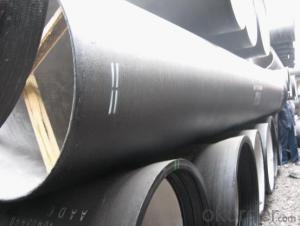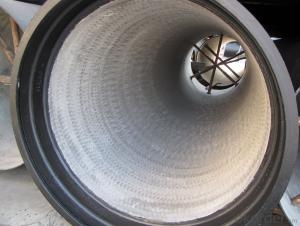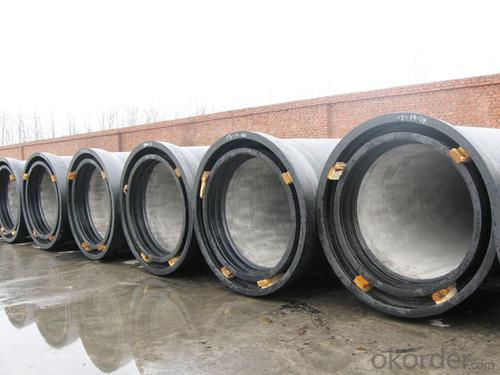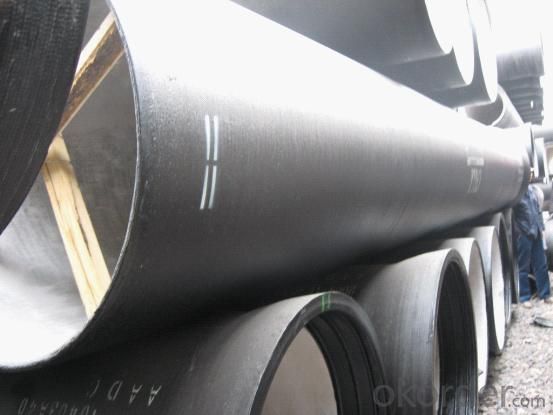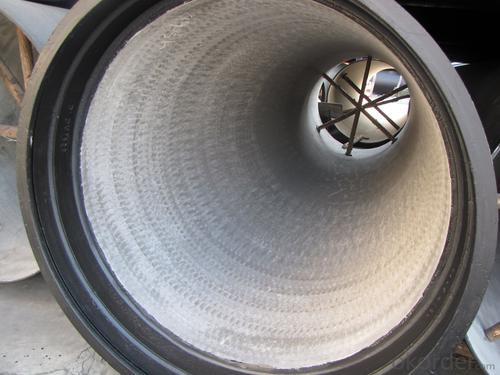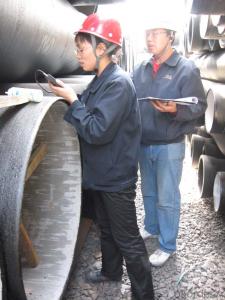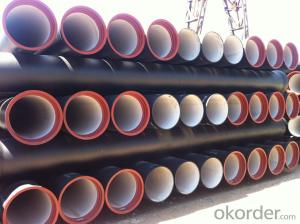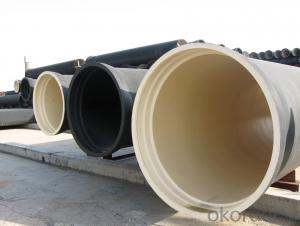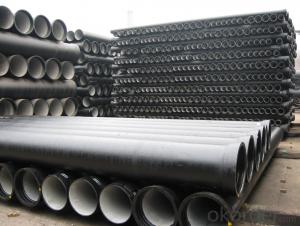Ductile Iron Pipe DN2000
OKorder Service Pledge
Quality Product, Order Online Tracking, Timely Delivery
OKorder Financial Service
Credit Rating, Credit Services, Credit Purchasing
You Might Also Like
Specifications
Quick Details
| Place of Origin: | China (Mainland) | Brand Name: | CMAX | Model Number: | T type / K type / Flange type |
| Length: | 6m / 5.7m / Negotiable | Standard: | ISO2531 / EN545 / EN598 | Application: | Potable / Sewage water |
| Diameter: | DN80~DN2200 | Shape: | Round | Hardness: | 230 |
| Pipe Wall Thickness: | standard | Pull Strength: | 420 | Yield (≥ MPa): | 300 |
| Material: | Ductile Iron | Type: | Centrifugal ductile cast iron pipe | Certification: | ISO2531 / EN545 / EN598 |
| Outer Diameter: | 80-2200 | Thickness: | standard | Specification: | DN80~DN2200 |
| |
The advantages to the customer:
Trustworthy financial strength.
One-stop shopping.
Fast and efficient service.
Coordination of shipments from multiple plants.
Specialists of the overseas shipping process.
A more competitive price.
- Q: Can ductile iron pipe be used for wastewater treatment plants?
- Yes, ductile iron pipe can be used for wastewater treatment plants. Its durability, corrosion resistance, and high strength make it a suitable choice for handling the harsh and corrosive environment of wastewater treatment processes. Additionally, ductile iron pipes can withstand high operating pressures and provide long-term reliability, making them an ideal option for transporting wastewater within the treatment plant.
- Q: What is the weight of ductile iron pipes compared to other materials?
- Compared to other commonly used materials in the construction industry, ductile iron pipes tend to be heavier. The weight of these pipes can vary depending on their specific size and dimensions, but they are usually heavier than materials like PVC, HDPE, and steel pipes. The primary reason for this increased weight is the dense nature of ductile iron, which grants it durability, strength, and resistance to corrosion. However, this weight also presents challenges in terms of transportation, installation, and handling, necessitating appropriate equipment and techniques for safe and efficient installation. Despite being heavier, ductile iron pipes offer numerous advantages in terms of longevity and performance in various applications.
- Q: Can ductile iron pipes be installed outdoors?
- Ductile iron pipes can be installed outdoors.
- Q: How do ductile iron pipes handle cyclic loading in offshore applications?
- Ductile iron pipes are known for their exceptional strength and durability, making them a suitable choice for various applications, including offshore use. When it comes to handling cyclic loading in offshore environments, ductile iron pipes have several characteristics that contribute to their performance. Firstly, ductile iron pipes have a high resistance to fatigue failure. Fatigue failure occurs when a material experiences repeated cycles of stress, which can cause cracks to initiate and propagate over time. Ductile iron pipes are designed to withstand cyclic loading without compromising their structural integrity, thanks to their inherent ductility and ability to absorb and distribute stress effectively. Additionally, ductile iron pipes possess excellent impact resistance. Offshore environments are prone to dynamic and unpredictable forces, such as waves and currents, which can exert sudden and high impact loads on the pipes. The high impact resistance of ductile iron allows it to withstand these forces without deformation or fracture, ensuring the pipes remain intact and functional. Moreover, ductile iron pipes have a unique microstructure that enables them to resist corrosion. Offshore applications expose pipes to harsh environmental conditions, including saltwater, which can accelerate the corrosion process. However, the protective graphite matrix in ductile iron pipes acts as a barrier, preventing corrosive agents from reaching the underlying metal and significantly extending the pipes' service life. Furthermore, ductile iron pipes have a high load-carrying capacity. In offshore applications, pipes often need to support heavy loads, such as those from equipment, structures, or seabed settlements. Ductile iron's superior strength allows it to bear these loads effectively, maintaining the structural integrity and stability of the system. Lastly, ductile iron pipes offer ease of installation and maintenance. Their lightweight nature makes them easier to handle and transport during offshore operations. Additionally, their corrosion resistance minimizes the need for frequent maintenance, reducing downtime and costs associated with repairs and replacements. In conclusion, ductile iron pipes exhibit excellent performance in handling cyclic loading in offshore applications. Their resistance to fatigue failure, impact resistance, corrosion resistance, high load-carrying capacity, and ease of installation and maintenance make them a reliable and efficient choice for offshore environments.
- Q: What are the different coatings available for ductile iron pipe?
- Ductile iron pipes offer a range of coating options, each with their own advantages and protective qualities for different uses. Some commonly utilized coatings are as follows: 1. Cement Mortar Lining: By applying a layer of cement mortar to the pipe's interior surface, this coating provides excellent resistance against corrosion and abrasion. It is ideal for transporting water and sewage. 2. Bituminous Coating: Consisting of asphalt or coal tar pitch applied to the pipe surface, bituminous coatings offer effective protection against corrosion. They are commonly used for underground pipes in water and wastewater systems. 3. Fusion-Bonded Epoxy (FBE) Coating: FBE coatings are created by electrostatically applying an epoxy powder layer to the pipe surface, which is then cured at high temperatures. This coating offers exceptional corrosion resistance and is suitable for harsh environments and corrosive substances. 4. Polyurethane Coating: Polyurethane coatings provide excellent resistance against abrasion, impact, and corrosion. They are often used for pipes exposed to abrasive materials or requiring additional protection against external damage. 5. Zinc Coating: Also known as galvanized coatings, zinc coatings involve applying a layer of zinc to the pipe's surface. This coating offers excellent corrosion protection, making it suitable for pipes exposed to moisture and aggressive environments. 6. Polyethylene Encasement: Polyethylene encasement involves wrapping the pipe with a layer of polyethylene film or tape. This coating acts as a physical barrier against corrosion and is commonly used in conjunction with other coatings for added protection. To determine the most appropriate coating for ductile iron pipes, it is crucial to consider the specific requirements of the application, such as the type of fluid being transported and the environmental conditions.
- Q: What are some common applications for ductile iron pipe?
- Ductile iron pipe, also known as DI pipe, is widely used in various applications due to its durability, strength, and corrosion resistance. Here are some common applications for ductile iron pipe: 1. Water Distribution: Ductile iron pipe is extensively used for the distribution of potable water. Its high tensile strength allows it to withstand high water pressure, making it ideal for water mains, water transmission lines, and water distribution networks. 2. Sewer Systems: Ductile iron pipe is commonly used in sewer systems due to its resistance to corrosion and its ability to handle high loads. It is often used for gravity sewer lines, force mains, and stormwater systems. 3. Industrial Applications: Ductile iron pipe finds applications in various industrial settings, including power plants, chemical plants, and refineries. It is used for the transportation of water, wastewater, and other fluids in these industries. 4. Irrigation Systems: Due to its strength and long lifespan, ductile iron pipe is suitable for irrigation systems, especially in agricultural areas. It is used to transport water for irrigation purposes, ensuring efficient water distribution in fields and farms. 5. Fire Protection Systems: Ductile iron pipe is commonly used for fire protection systems, including fire hydrants, fire sprinkler systems, and fire suppression systems. Its robustness and resistance to high pressure make it an excellent choice for reliable and effective fire protection. 6. Pumping Stations: Ductile iron pipe is often used in pumping stations, which are crucial for various water-related applications. It is employed in water intake systems, wastewater pumping stations, and water treatment plants to transport water and wastewater efficiently. 7. Municipal Infrastructure: Ductile iron pipe is widely used in municipal infrastructure projects, including road drainage systems, culverts, and bridge crossings. Its strength, durability, and resistance to external loads make it suitable for these applications. 8. Gas Distribution: Although more commonly used for water-related applications, ductile iron pipe is also used for the distribution of natural gas and other gases. It is preferred for gas distribution due to its resistance to corrosion and its ability to withstand high-pressure environments. Overall, ductile iron pipe has a wide range of applications and is preferred in situations that require strength, durability, and resistance to corrosion. Its versatility and reliability make it a popular choice for various infrastructure projects and industrial applications.
- Q: Ductile iron and gray iron is what are the advantages and disadvantages of it
- Ductile iron with high strength, gray cast iron wear-resistant, vibration good.This is the reason why large quantities of grey iron are used as gear in imported vehicles.
- Q: How do ductile iron pipes perform in freeze-thaw cycles?
- Ductile iron pipes perform exceptionally well in freeze-thaw cycles. The material properties of ductile iron, such as its high tensile strength and excellent impact resistance, make it highly resistant to the stresses caused by freeze-thaw cycles. Unlike other materials, ductile iron pipes can withstand the expansion and contraction that occurs during freezing and thawing without cracking or breaking. One of the key reasons why ductile iron pipes excel in freeze-thaw conditions is their ability to absorb and dissipate stresses. The high ductility of the material allows it to deform slightly under stress, thereby releasing the built-up pressure and preventing any damage to the pipe. This characteristic ensures that the pipes can handle the repeated cycles of freezing and thawing without compromising their structural integrity. Additionally, ductile iron pipes have a protective and durable coating, such as cement mortar lining or polyethylene encasement, which further enhances their resistance to freeze-thaw cycles. These coatings provide an additional layer of protection and prevent water from coming into direct contact with the iron, reducing the potential for corrosion. Furthermore, ductile iron pipes have a long service life, typically exceeding 100 years. This longevity is attributed to the material's inherent strength and resistance to various environmental factors, including freeze-thaw cycles. The pipes' ability to withstand these cycles without significant damage ensures the reliability and durability of the water distribution system, even in areas prone to freezing temperatures. In conclusion, ductile iron pipes are highly reliable and perform exceptionally well in freeze-thaw cycles. Their high tensile strength, impact resistance, ability to absorb stresses, and protective coatings make them a preferred choice for water distribution systems in regions with harsh winter conditions.
- Q: Are ductile iron pipes suitable for use in oil refineries?
- Yes, ductile iron pipes are suitable for use in oil refineries. Ductile iron is a type of cast iron that offers a unique combination of strength, durability, and flexibility, making it an excellent choice for various applications, including oil refineries. One of the key advantages of ductile iron pipes is their high tensile strength, allowing them to withstand the high pressure and stress commonly found in oil refining processes. This strength is crucial for the transportation of various fluids, including crude oil, refined petroleum products, and chemicals within the refinery. Additionally, ductile iron pipes have excellent corrosion resistance properties, making them highly resistant to the corrosive effects of oil, chemicals, and other substances typically present in oil refineries. This corrosion resistance ensures the longevity and reliability of the pipes, reducing the need for frequent maintenance and replacement. Furthermore, ductile iron pipes have exceptional ductility, which means they can absorb and withstand significant impacts and vibrations without fracturing or breaking. This quality is advantageous in oil refineries where there may be frequent movement or potential stressors due to machinery, equipment, or ground settlement. Moreover, ductile iron pipes have a smooth interior surface that reduces friction, allowing for efficient fluid flow and minimizing pressure loss. This characteristic is essential in oil refineries, as it helps optimize the transportation of fluids, ensuring a smooth and reliable production process. In conclusion, ductile iron pipes are suitable for use in oil refineries due to their high tensile strength, corrosion resistance, ductility, and smooth interior surface. These pipes provide a reliable and durable solution for transporting various fluids within the refinery, contributing to the efficient and safe operation of oil refining processes.
- Q: How do ductile iron pipes handle pipe deflection?
- Ductile iron pipes are known for their exceptional strength and flexibility, which allows them to handle pipe deflection effectively. Pipe deflection refers to the bending or curving of a pipe from its original straight alignment. When subjected to external forces, such as soil movement or heavy loads, ductile iron pipes have the ability to flex and adjust without fracturing or breaking. This is due to their unique composition, which includes nodular graphite inclusions that provide excellent ductility. The flexibility of ductile iron pipes enables them to absorb and distribute stress evenly along the pipe wall, preventing concentrated points of strain that could lead to failure. This characteristic allows the pipes to accommodate ground movement, settlement, and other external factors that may cause deflection. Additionally, ductile iron pipes have a high modulus of elasticity, which means they can withstand significant deformation before reaching their ultimate limit. This property allows the pipes to maintain their structural integrity even when subjected to substantial deflection. Furthermore, the joint system used in ductile iron pipe installations contributes to their ability to handle pipe deflection. The restrained joint design ensures a tight and secure connection between pipe sections, reducing the potential for joint separation or leakage under deflection-induced stress. Overall, ductile iron pipes have excellent resistance to pipe deflection. Their flexibility, high modulus of elasticity, and reliable joint system make them a preferred choice for various applications, including water distribution, wastewater management, and sewer systems.
Send your message to us
Ductile Iron Pipe DN2000
OKorder Service Pledge
Quality Product, Order Online Tracking, Timely Delivery
OKorder Financial Service
Credit Rating, Credit Services, Credit Purchasing
Similar products
Hot products
Hot Searches
Related keywords

